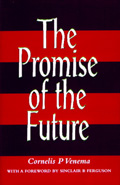
Cornelis P. Venema
Reviewed by: Richard B. Gaffin, Jr.
The Promise of the Future, by Cornelis P. Venema. Published by Banner of Truth, 2000. Hardcover, 538 pages, list price $39.99. Reviewed by Prof. R. B. Gaffin, Jr.
This is arguably the most important major Reformed study in biblical eschatology since The Bible and the Future (1972), by Anthony Hoekema, a former teacher of the author, who is professor of doctrinal studies at Mid-America Reformed Seminary. Expanded from a series of articles in The Outlook magazine, this book will benefit a wide range of readers—seminary and college teachers and students, pastors, elders, and other church members alike. Parts or even the entire book will serve well for Bible study groups at most any level. Any serious student of Scripture will want to consult it.
The book is divided into six major parts, structured around the theme of the future. lt also includes an ample glossary, especially helpful for readers in need of more basic orientation.
The first two parts, which are both relatively brief, treat in turn the essential features of the eschatological "future" that have already been inaugurated at Christ's first coming, and then, with exemplary biblical restraint, the so-called "intermediate state" of the dead. The large balance of the book deals with Christ's return and its consequences—the still-future aspect of the biblical promise of the "future."
The chapters on the kingdom make a good case for the author's "optimistic Amillennialism" (p. 360) and usefully articulate the main features and principal weaknesses of premillennialism (both historic and dispensational) and postmillennialism. He holds that the salvation of "all Israel" in Romans 11:26 most likely refers to a still-future, large-scale conversion event. (My own view, following Herman Ridderbos, is that this salvation takes place as a process over the entire inter-advental period.) This points up something that is too often missed: that to hold this interpretation does not of itself make one a postmil (which, by the way, is also true of John Murray's millennial position, in my view).
One of the most disconcerting developments in recent years within evangelicalism has been the resurgence of various forms of annihilationism. Largely in response to this trend, Dr. Venema makes the case that the Bible teaches eternal punishment. He does so in typically balanced fashion, neither overinterrogating Scripture and speculating beyond its teaching, nor downplaying or otherwise failing to do justice to what it does teach. Among available treatments of this issue, I'm not aware of anything of similar scope that is as solid and helpful.
This excellent book closes by considering the final destiny of the creation. Addressing the issue of "all new things or all things made new?" he convincingly shows that Scripture teaches the latter. Our ultimate hope is life in this creation, like ourselves renewed and consummated—and all, beyond our present comprehension, "to enjoy God forever."
I suppose the author could be faulted for ignoring contemporary critical theology (there is nothing, for instance, on Moltmann's influential "theology of hope"). But his response, I suspect, would likely be that to treat it responsibly would have meant making the book much too long and also would have lessened its value for his intended audience. With that I would agree.
Recently Dr. Venema was appointed president of Mid-America. This will surely be for the seminary's good. But we can only hope that the increased administrative duties involved will not keep him from continuing to exercise the evident teaching and writing gifts that the Lord has given him for the good of the church.
November 17, 2024
November 10, 2024
Taming the Fingers: Heavenly Wisdom for Social Media
November 03, 2024
Unfolding Redemption: Exploring the History and Order of Salvation
October 27, 2024
You Are Still a Mother: Hope for Women Grieving a Stillbirth or Miscarriage
October 06, 2024
September 29, 2024
September 22, 2024
Christianity and New Religious Movements: An Introduction to the World’s Newest Faiths
© 2024 The Orthodox Presbyterian Church